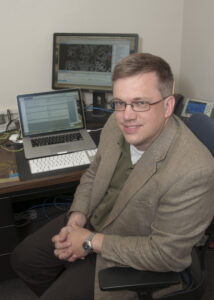2024 Ethics Champion Mark Hoffman, PhD
By Trudi Galblum
Marketing, Communications and Grant Writing
 Outside of academic and industrial circles, not many people in the 2010s were paying attention to how artificial intelligence might affect health and healthcare, and even fewer people were focused on the ethical issues surrounding its use.
Outside of academic and industrial circles, not many people in the 2010s were paying attention to how artificial intelligence might affect health and healthcare, and even fewer people were focused on the ethical issues surrounding its use.
Mark Hoffman was one of those people and an important reason why the Center for Practical Bioethics honors him as an Ethics Champion.
Ethical AI Advocate
Mark joined the Board of the Center for Practical Bioethics in 2013, the same year he was appointed to the faculty at the University of Missouri-Kansas City in the Departments of Biomedical and Health Informatics and Pediatrics and founded the Center for Health Insights at UMKC. He joined Children’s Mercy and the Children’s Mercy Research Institute full time as Chief Research Information Officer in 2016.
“The Center’s emphasis on practical bioethics resonated with me from when I was Vice President for Genomics and Research at Cerner,” he said.
While serving on the Center’s board, Mark advocated for the Center to begin to address technology-related topics where he believed the Center could have a real impact.

In August 2019, Mark addressed 60 innovators and thought leaders from KC’s health entities gathered by the Center at Cerner to develop recommendations for incorporating ethics analysis and evaluation into AI development and implementation processes.
Since then, he has served on the Center’s 20-member Ethical AI Advisory Council.
“Over the last five years working with Mark,” said Dr. Lindsey Jarrett, Vice President of Ethical AI at the Center, “his thought leadership and guidance has provided our community program with practical tools that can be implemented across various organizations in the healthcare industry.”
An Intentional Approach
Mark takes a middle of the road position with respect to the risks and benefits of AI in healthcare.
“In my view,” he said, “it would be unethical not to utilize AI, but to the extent that there’s a major risk of amplifying existing biases, we need to articulate how to mitigate those risks.
“For example, when buying a system that claims to have AI, what should the purchaser be asking the vendor? The Center’s Ethical AI Initiative is doing work that is largely unique by defining a set of procurement guidelines.”
The feedback that Mark says he received from Children’s Mercy colleagues who participated in a recent Ethical AI workshop held by the Center is one of the most satisfying outcomes from his involvement in the initiative.
“They shared how the workshop transformed how they think about the ethical dimensions of AI and equipped them to adopt an intentional approach to the topic,” he said.
About Mark Hoffman
A native of St. Louis and graduate of Raytown South High School, Mark earned his BA in Molecular Biology from William Jewell College and his doctorate in Bacteriology from the University of Wisconsin-Madison, with a minor in Biotechnology.
At Children’s Mercy Mark is responsible for ensuring that researchers have the technology platforms they need to do their work effectively and works closely with the hospital IT leadership to ensure security of these systems. He leads strategic efforts from genomics to population health. He also directs his own research program. Current projects include building technology to help perform recruitment of research subjects in a more equitable manner and an NIH grant using massive data resources to investigate the impact of climate change on fungal infections.
Mark says what he enjoys most about the work is the opportunity to make a difference, and what he enjoys most in his spare time is birdwatching. With a “life list” of over 300 birds he’s seen in his lifetime, he describes himself as an “advanced intermediate” practitioner.
He is grateful for the support of his wife, Ruth, and their two adult children, Jordan and Sophia.








